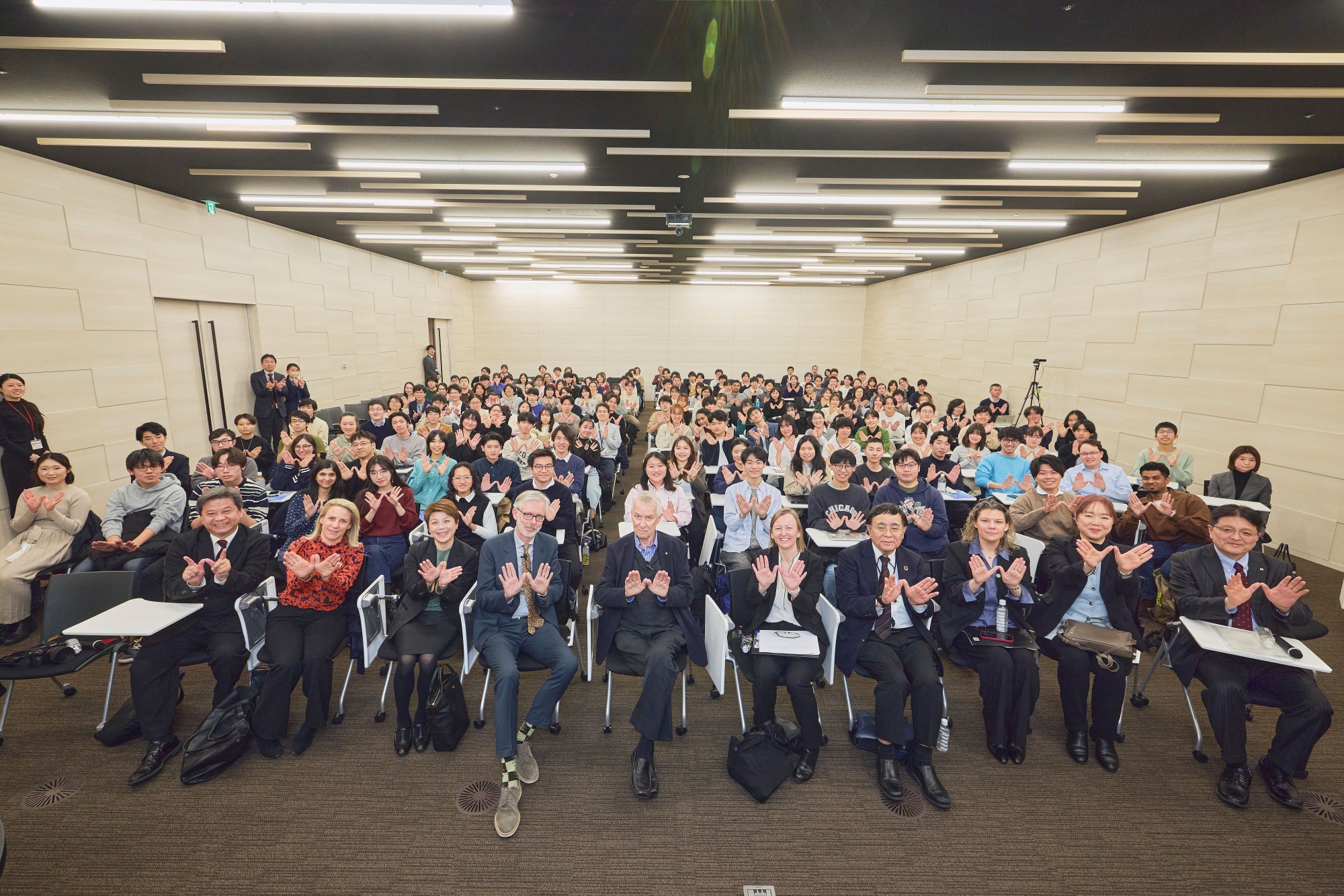A Nobel Laureate Conversation on Breaking Barriers in Science, Academia, and Life with Dr. Richard Roberts
Mon, Mar 24, 2025-
Tags
A Nobel Prize winner, a room full of curious minds, and a candid conversation on science, AI, and failure—this was not your typical academic talk.
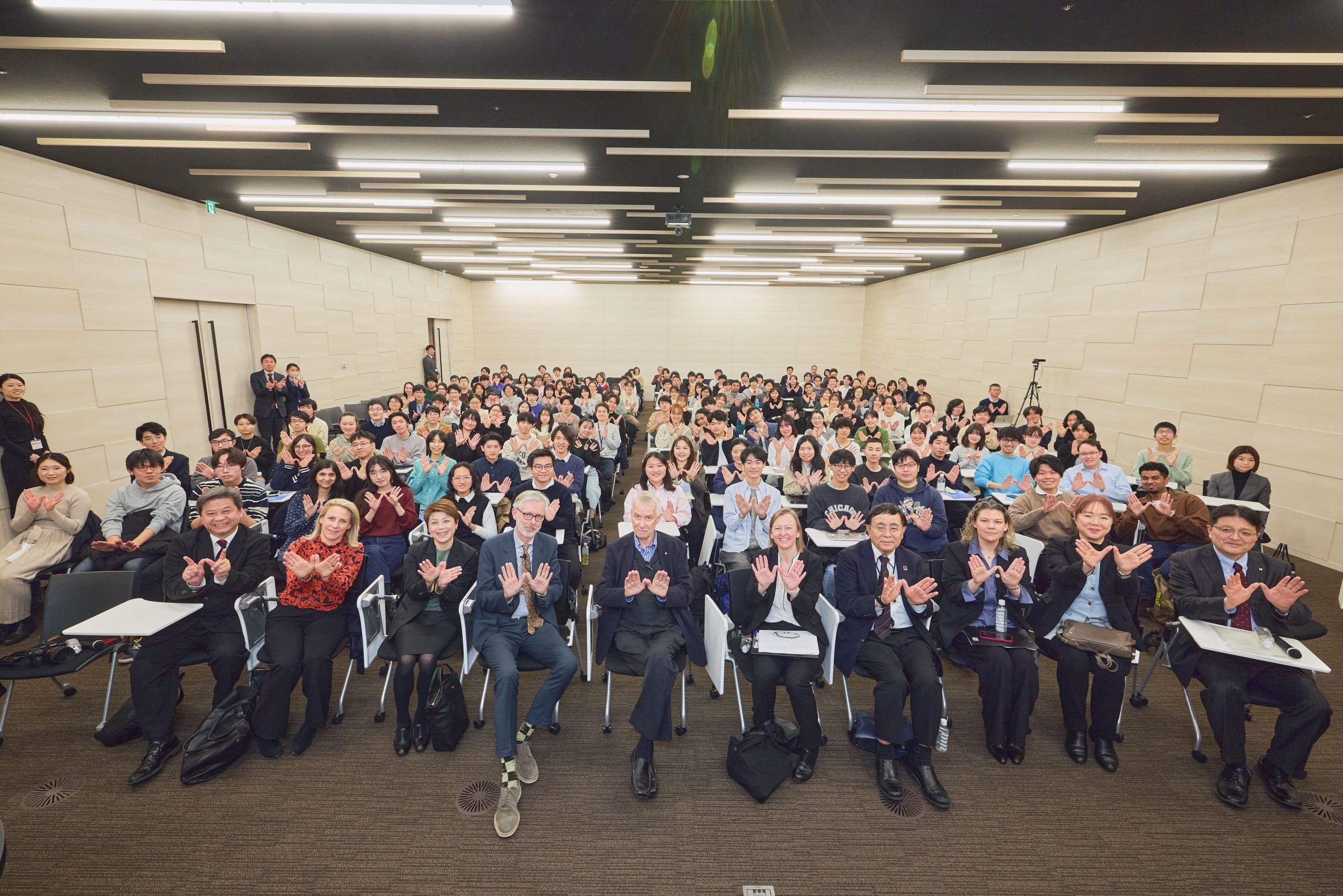
A group photo at Komatsu Hall
On March 10, 2025, Waseda University welcomed Dr. Richard Roberts, the 1993 Nobel Laureate in Medicine, for a lively forum and roundtable discussion titled “Nobel Prize Laureate Conversation”. His visit coincided with the Nobel Prize Dialogue Tokyo 2025, Japan’s domestic counterpart to the Nobel Week Dialogue.
The event took place at Komatsu Hall in the Research Innovation Center and was organized in partnership with the Waseda Center for a Carbon Neutral Society (WCANS), the International Affairs Division, the Faculty of Science and Engineering, and the Waseda Open Innovation Ecosystem Program for Pioneering Research (W-SPRING). It served primarily as a dynamic forum for nearly 200 Waseda students, faculty, and staff who attended.
Dr. Roberts, who won the 1993 Nobel Prize in Medicine alongside Dr. Phillip Sharp for discovering split genes, reshaped the scientific understanding of RNA splicing and gene regulation. Their breakthrough fundamentally altered how scientists study genetics, opening new frontiers in molecular biology. Beyond his research, Dr. Roberts is a strong advocate for ethical science, responsible biotechnology, and the global accessibility of scientific knowledge.
On Winning the Nobel, Failing, and Postmortem
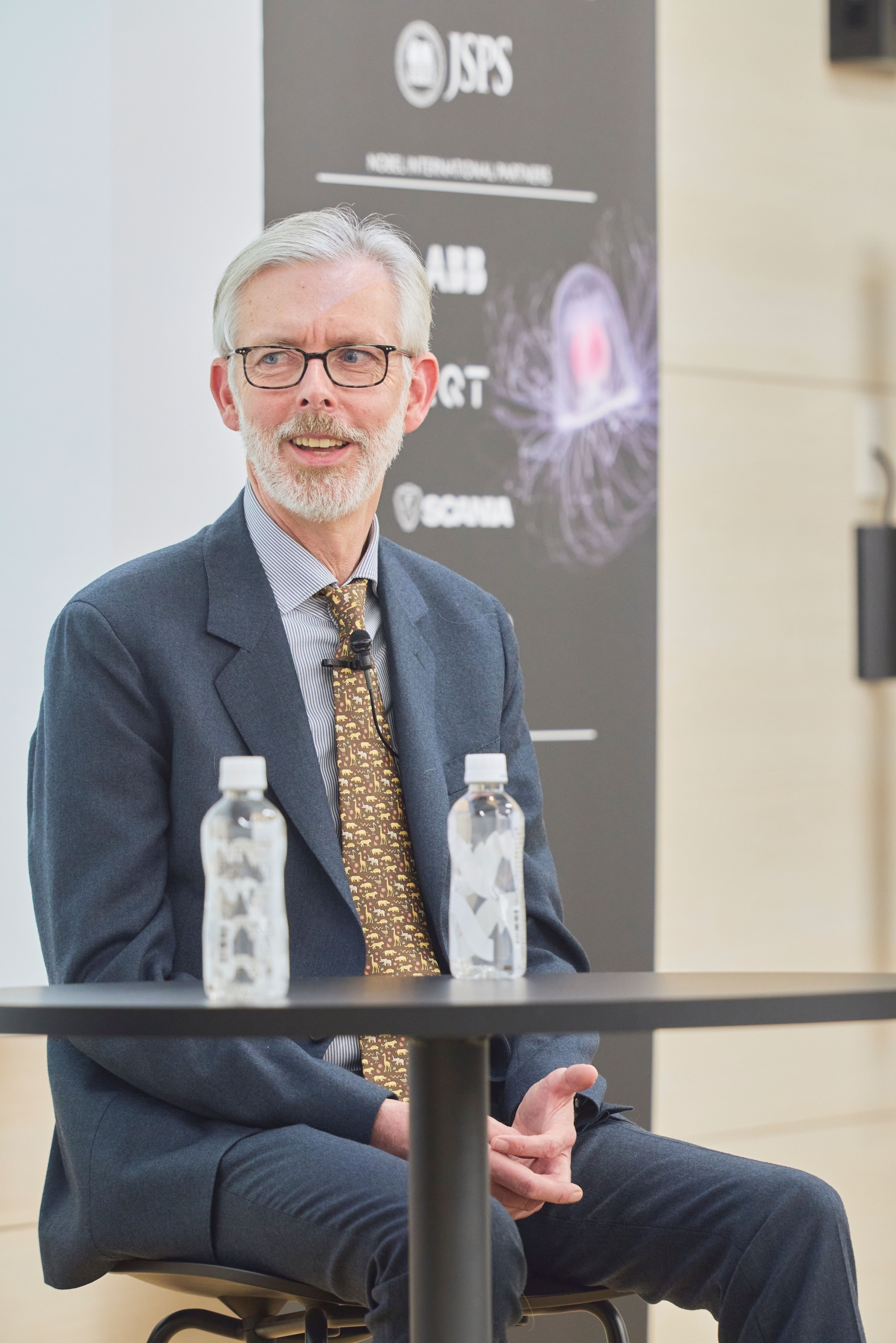
Moderator Dr. Adam Smith
The discussion kicked off with an introduction from Dr. Adam Smith, Chief Scientific Officer of Nobel Prize Outreach, who moderated the session. He warmly welcomed students to an open and interactive forum where anyone could ask anything—whether about Dr. Roberts’ groundbreaking research, his experiences in the scientific community, or the challenges and triumphs that shaped his career. No topic was off-limits, and Dr. Roberts tackled questions big and small with sharp insight and humor. What started as a formal Q&A soon turned into a free-flowing exchange—with curiosity leading the way.
One of the first topics addressed was the nature of scientific discovery—the spark of breakthroughs and the quiet, unyielding perseverance that fuels them. Dr. Roberts shared that winning a Nobel Prize was never his goal; rather, it was the result of persistent effort and repeated failures. He remarked, “Don’t worry about getting a Nobel; it’s luck,” stressing that while recognition may come, the true focus should always be on pursuing meaningful work and striving for excellence in one’s field.
Of course, luck rarely shows up without bringing failure along for the ride. Dr. Roberts explained that scientific breakthroughs often stem from working on problems that seem impossible at first. Success in research, he noted, requires multiple attempts, thorough postmortem analyses of failures, and the courage to start over. Rather than a setback, failure should be seen as an essential part of refining ideas and pushing the boundaries of discovery.
Yet, while failure shapes a scientist, recognition amplifies their voice. After receiving the Nobel Prize, Dr. Roberts found that its greatest impact was not on his scientific work but on his ability to advocate for causes he deeply cares about. Before winning the award, he had been outspoken on various scientific and humanitarian issues, but his voice often went unheard. With recognition came a platform that enabled him to lead initiatives against the misuse of science and advocate for various humanitarian causes. He saw winning the Nobel as both a responsibility and an opportunity.
On AI and the Scientific Community
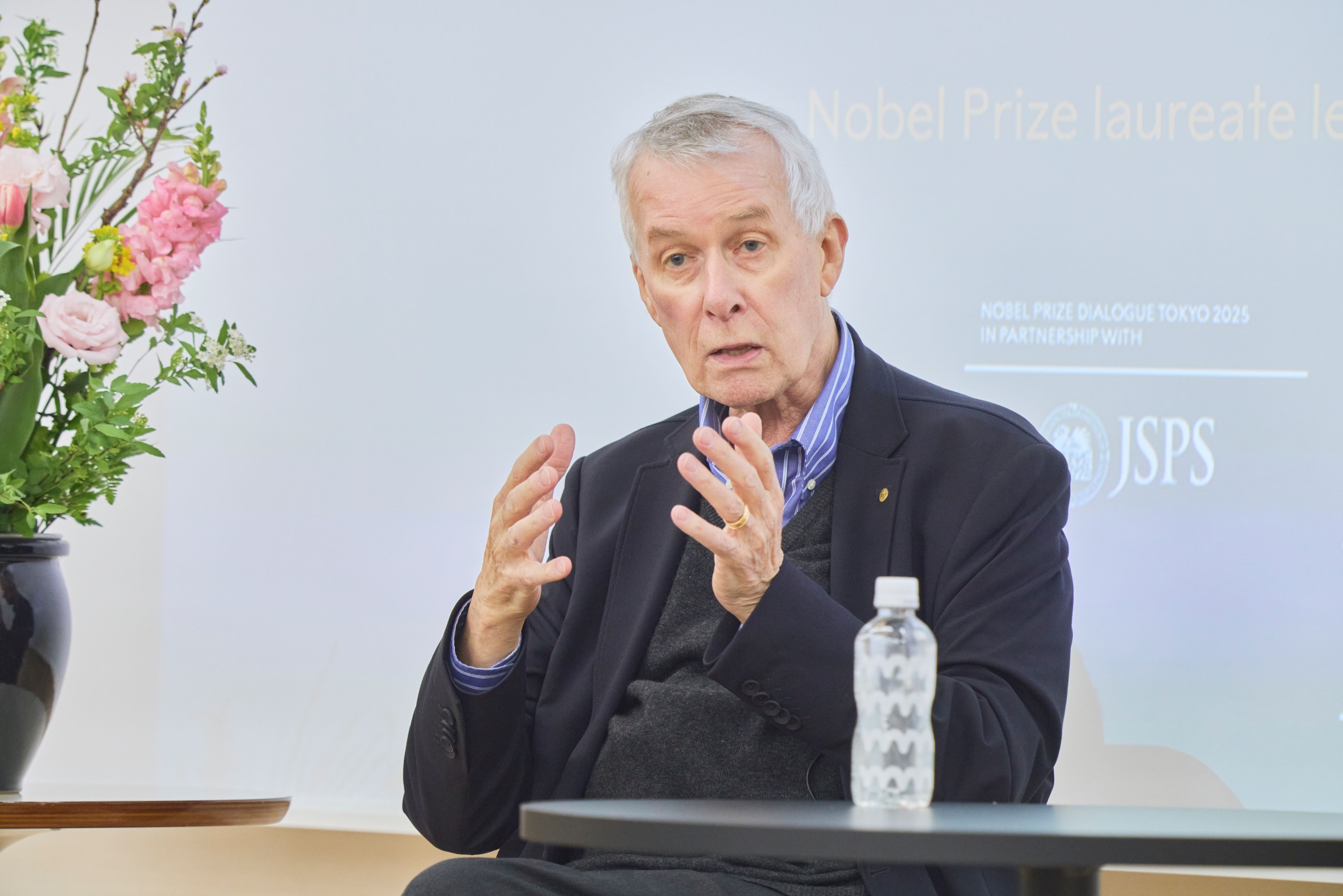
Nobel Prize Laureate Dr. Richard Roberts
Another major concern students raised was the expanding role of AI in scientific research and its accompanying challenges. Dr. Roberts acknowledged that while AI is an incredibly powerful tool, it has its limitations—particularly in how it processes and presents information. One of the biggest issues, he pointed out, is that AI often delivers conclusions without showing the steps that led to them, making it difficult for scientists to verify its findings. As someone who values meticulous documentation, from experiments to methodologies, he stressed that transparency and accuracy in AI-generated research are critical. He emphasized that the next generation of scientists must not only develop AI responsibly but also ensure that it is applied ethically and effectively. One example he highlighted was the potential of AI to fight misinformation within the scientific community, particularly by filtering out predatory or falsified research papers.
Naturally, this led to a broader discussion on scientific misinformation—a problem that extends beyond research labs and into public discourse. Whether on social media or even within academic circles, misinformation spreads rapidly, sometimes even coming from scientists. Dr. Roberts stressed that combating false information requires clear and accessible communication. He urged young scientists to open doors to knowledge, choosing language that welcomes rather than alienates those outside the scientific sphere. To help with this, he pointed students toward reliable sources like the Genetic Literacy Project, a nonprofit science education platform that promotes accessible and disruptive innovations in biotechnology, biomedicine, gene editing, vaccines, disease control, and AI-driven advancements in science.
Beyond misinformation, Dr. Roberts openly criticized the flaws in the academic publishing system. He shared his strong dislike for impact factors and made it clear that he does not focus on the number of publications a researcher produces. What matters, he argued, is the substance of the work, not the prestige of the journal it appears in. He pointed out how academia often places too much emphasis on journal rankings rather than the actual quality and impact of research—a reflection of the ‘publish or perish’ mindset that haunts every post-graduate student. For science to truly advance, he stressed, contributions should be valued based on their significance rather than arbitrary metrics.
On the Importance of Mentorship
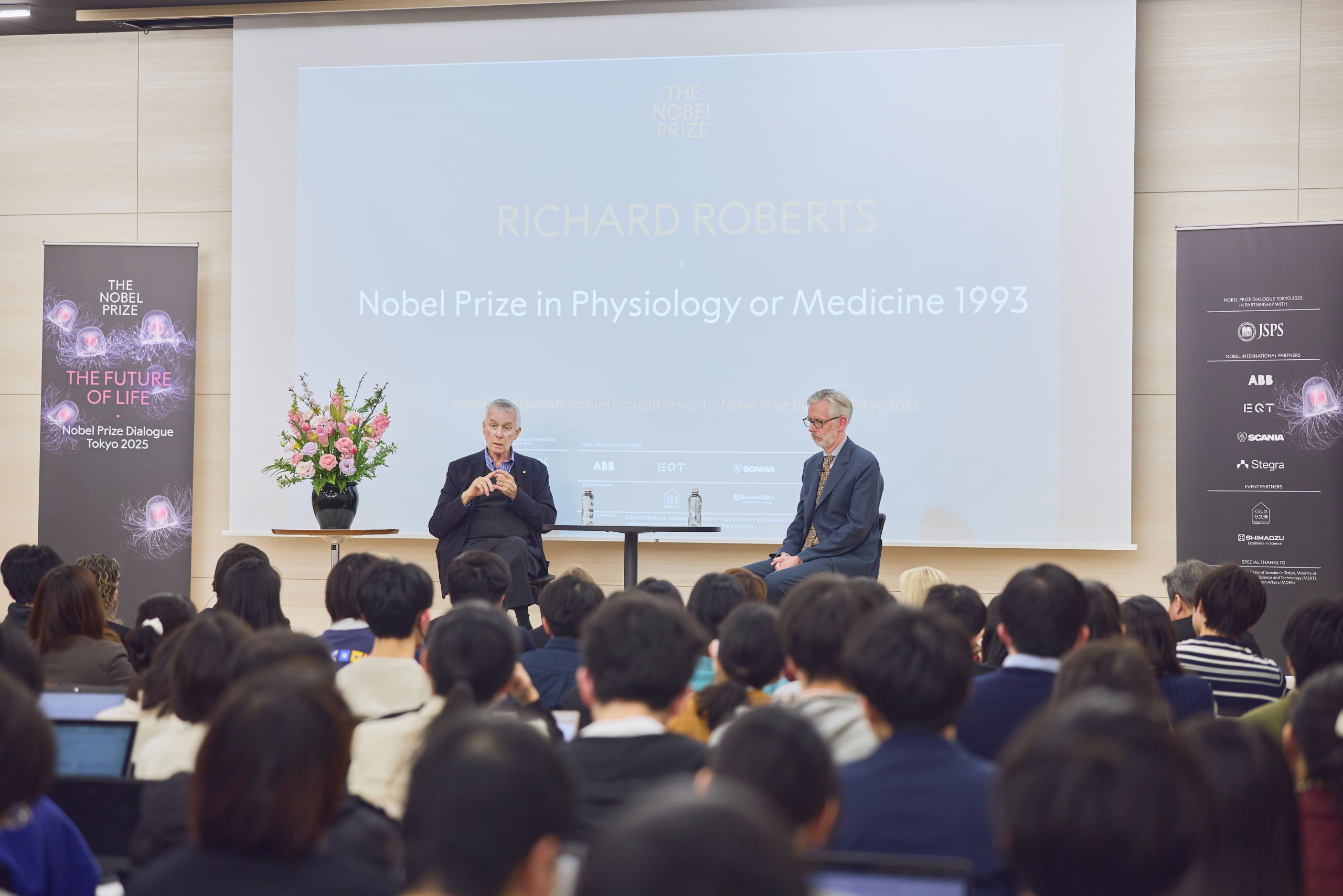
Dr. Roberts and Dr. Smith replying to questions from the audience
While misinformation and academic pressure present a challenge to the future of science, mentorship and inspiration are what sustain it. No scientist succeeds entirely on their own. When asked about the people who shaped his career, Dr. Roberts mentioned two key influences: Kazu Kurosawa, his Japanese postdoctoral fellow whom he worked with during his PhD, and Fred Sanger, a two-time Nobel Prize winner whose work in sequencing revolutionized genetics.
Dr. Roberts fondly recalled his time in Sanger’s lab after completing his postdoctoral research, where he was deeply impressed by Sanger’s intelligence and humility. Despite being one of the greatest minds in science, Sanger remained modest and approachable—qualities that, to Dr. Roberts, defined what a true scientist should be. More than his groundbreaking discoveries, it was Sanger’s character that left a lasting impression. His mentors’ influence, Dr. Roberts noted, extended beyond technical expertise. Their guidance not only shaped his approach to research but also instilled in him a scientific mindset—one that values collaboration, humility, and continuous learning.
Rethinking Research at the Roundtable
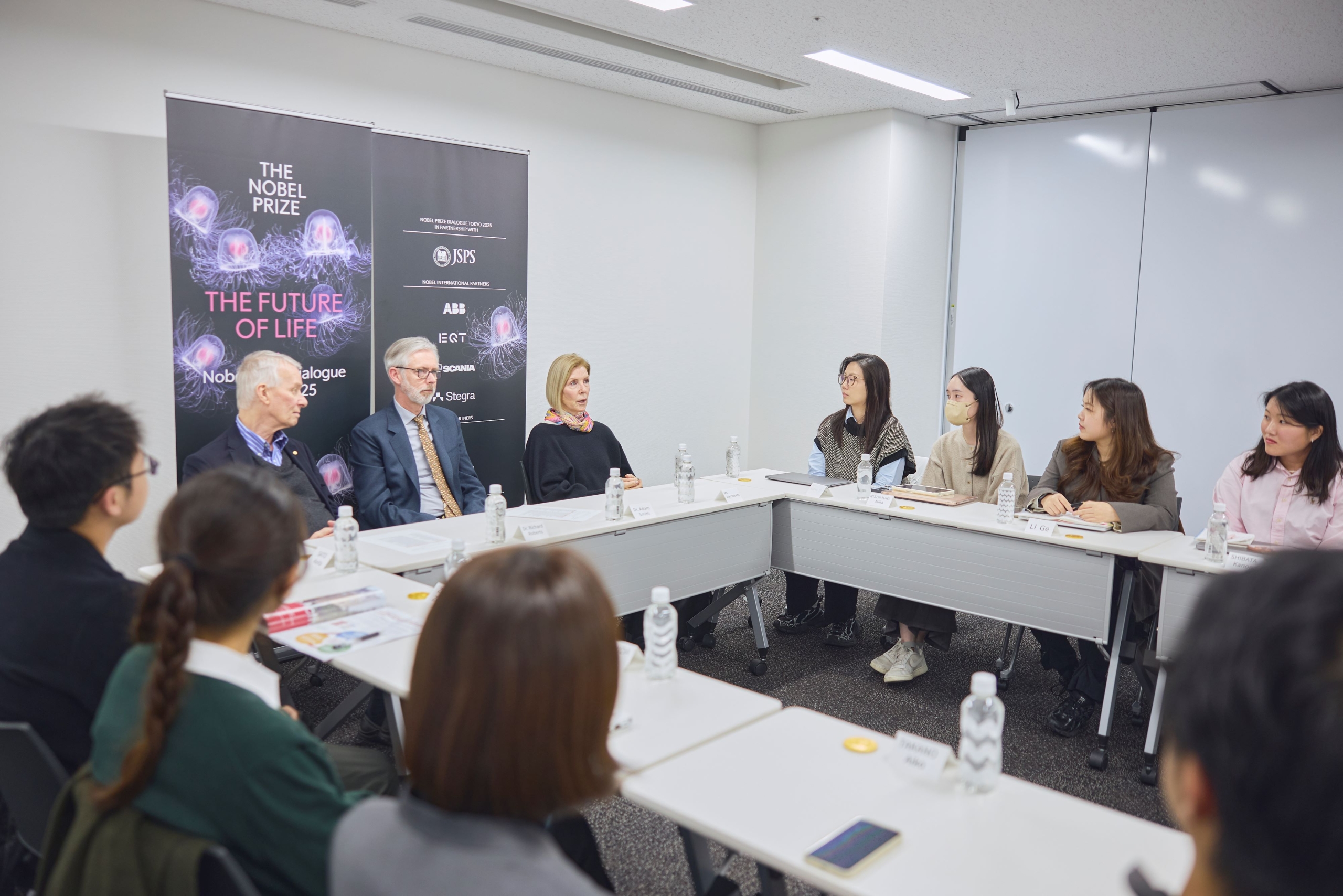
Dr. Roberts’ wife, Jean, sharing her insight
Building on the themes of mentorship and scientific philosophy, the roundtable discussion that followed the main Nobel conversation offered a more personal and in-depth exploration of key issues in science, academia, and life. This session brought together a select group of 21 undergraduate and graduate students from Waseda for an open exchange.
Dr. Smith returned as moderator. Adding an unexpected yet valuable perspective, Dr. Roberts’ wife, Jean, also joined the discussion, sharing insights into the challenges of supporting a partner committed to causes greater than himself and how women often face similar struggles while balancing their careers and personal lives. Together, the three revisited key discussions from the main conversation while inviting fresh perspectives on new topics.
One of the recurring issues was the impact of AI on scientific research and the spread of misinformation. Again, while AI holds great potential for advancing science, it also introduces risks, especially in how it processes and presents information. Students mentioned that misinformation spreads quickly on social media, particularly when it comes to scientific information. Dr. Roberts went on to emphasize that scientists have a duty to communicate clearly and accurately, ensuring that reliable knowledge reaches a wider audience. He encouraged students to actively participate in public discussions.
Beyond AI and misinformation, the discussion expanded into new territory, covering the value of interdisciplinary research and the differences between academic and industry careers. Dr. Roberts stressed that titles and institutional labels matter far less than the ability to apply different tools to solve problems and pointed out that academia offers greater freedom, whereas industry tends to be more structured. He also encouraged students to ask ‘stupid’ questions, pointing out that many breakthroughs happen simply because someone dares to ask what others overlook. The best way to discover what’s known—and what isn’t—is to stay curious and engage with others.
The roundtable also touched on work-life balance in academia, with Jean sharing her perspective on the additional hurdles women face, particularly when starting families. She described this challenge not as a ‘balanced routine’ but a constantly shifting ‘dynamic’ that requires adaptability and resilience.
Dr. Roberts, with insightful contributions from Dr. Smith and Jean, left aspiring scientists with this reminder: science thrives not on certainty but on perseverance. Open access fuels progress, hard work shapes breakthroughs, and the company of like-minded thinkers turns solitary struggles into collective victories. And when failure comes—as it always does—it should be welcomed, for it is the heartbeat of discovery.
This article was written by the following Student Contributor:
Joanna Ligon
Graduate School of International Culture and Communication Studies


